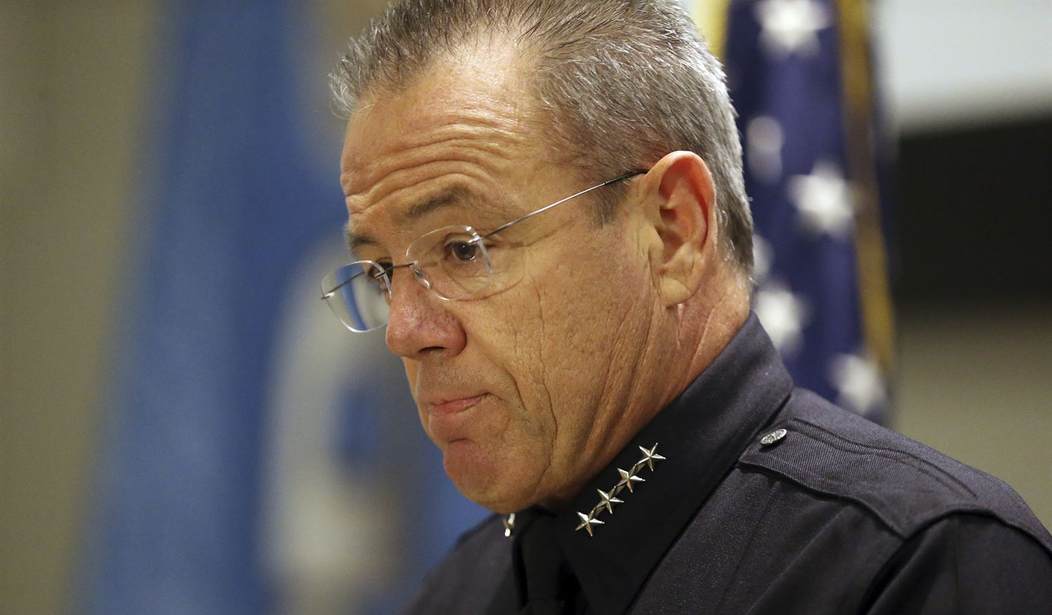“If you want to be loved,” said the instructor on my first day in the police academy, “you should have joined the fire department.” It was almost 40 years ago that this bit of wisdom was imparted to me, and rare is the rookie cop who hasn’t heard it since or who won’t hear it in the future. Assuming, that is, there will be any more rookie cops.
Consider the burdens a prospective police officer must accept in choosing a career in law enforcement today. He must be willing to work odd hours for modest compensation while risking death or serious injury; he must be willing to bear responsibility for all the social ills in the community he serves; he must endure scorn and mockery from any and all who choose to accost him and instruct him on the errors he is perceived to have made; and he must understand that should a confrontation with a lawbreaker turn violent, as some of them always do, he will be blamed, and perhaps fired or even imprisoned, for any outcome deemed less than optimal, especially if the racial calculus of the encounter attracts the attention of his sophisticated betters in the media.
How many people, in a time of rising employment as the nation recovers from the virus-induced recession, are willing to take up these burdens? Not many, as it turns out, which should come as no surprise to anyone giving even cursory attention to current events. Just as troubling, tenured officers are choosing to retire earlier than they might have, and many still short of retirement age are fleeing big-city departments for the suburbs or leaving the profession altogether.
I’ve been a cop for almost 40 years, long enough to have seen the pendulum swing a bit, but never have I seen the situation so grim, with so many cops in so many cities utterly demotivated. And who suffers from this? Not the wokesters marching about and carrying on while purporting to care so much about black lives, certainly. It is rather the law-abiding citizens of America’s inner cities who, if they’re not being gunned down themselves, are forced to navigate the neighborhood rivalries and petty squabbles that so often result in gunplay. Shootings have risen dramatically in Chicago and New York City, to cite just two examples, and though the violence in my hometown of Los Angeles hasn’t increased as alarmingly as elsewhere, it is disconcerting for the city’s cops to hear their chief’s explanation for it.
The L.A. Times Says There’s a ‘SWAT Mafia’ in the LAPD – the Statistics Say Otherwise
Chief Michel Moore, demonstrating the type of shameless political pandering that propelled him into the post, attributes L.A.’s crime spike to the COVID-19 pandemic, which, he says, has led to economic despair and heightened interpersonal dramas.
“What we’re sensing is a lot of stress, a lot of communities that are on edge, a certain amount of depression,” Moore said at a recent meeting of the city’s police commission. Even more laughably, he said virus-related restrictions on hospital visits have contributed to the bloodshed. Quoting from the Los Angeles Times:
[Moore] also said that pandemic-related rules barring visitors from local hospitals have prevented trained violence intervention workers from visiting the bedsides of surviving shooting victims — eliminating the opportunity to provide resources and emotional support, address their anger and help prevent retaliatory violence on the streets.
Chief Moore is not as hopelessly dense as that statement would indicate. In speaking such gibberish he is merely reflecting the prevailing sentiments of Los Angeles Mayor Eric Garcetti and most members of the city council, to whom he is in debt for his handsomely compensated position, and who, like himself, would prefer to attribute their crime problem to something they cannot control and for which they, therefore, cannot be blamed.
The truth is much simpler but, in the current political climate, much more difficult to address. The streets, like all of nature, abhor a vacuum, and when the police are no longer seen as enforcers of the law and guardians of order, other forces will exert themselves according to their predatory inclinations. When police officers fear the potential consequences of taking action against a criminal suspect, they give that suspect a wider berth. The criminals, for their part, are aware of the shifting risk-to-reward ratio and move to occupy the space vacated by the police, abetted these days by the wokesters who revel in the protests but seldom dare to take them to the neighborhoods where crime is highest.
The pendulum will swing back someday, only after the loss of who knows how many lives, but when it does, how many cops will remain who know what to do about it?










Join the conversation as a VIP Member